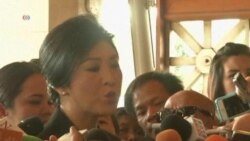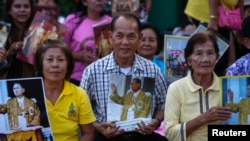BANGKOK —
Thai Prime Minister Yingluck Shinawatra has easily survived a no-confidence vote in parliament, where her party controls the majority of seats.
Lawmakers in Bangkok voted 297 to 134 Thursday against a measure that would have unseated her because of allegations of corruption.
Widespread political protests in Thailand continued on Wednesday as thousands of demonstrators tried to shut down government ministries and force Yingluck from office.
On the fourth day of protests, demonstrators continued to mass around several ministries and government provincial halls. In acts of civil disobedience, electricity was cut to some offices.
The protests remained largely peaceful. Prime Minister Yingluck held urgent talks with senior government ministry officials on how departments would continue to maintain normal work despite the disruptions.
Khun Samana, a Bangkok-based consultant and opposition supporter, said protesters are critical of the government's performance and its support for amnesty laws that favored close members of Yingluck's administration.
"People are demonstrating that they have the rights and the way the government has been managing our country is for their own self interest - it's not actually for the people, and this is the first time I have seen Thai people especially in Bangkok come out and voice their opinion and try to tell the government what they are doing is not right," said Samana.
Some protest leaders are doing more than criticizing the government. Protest leader and former opposition member of parliament Suthep Thaugsuban has proposed replacing the current elected government with a non-elected council. He said the body would oversee political reforms and fair elections.
Supporters said such moves are necessary to end the influence of Thaksin Shinawatra, a billionaire businessman and brother of the prime minister. Thaksin fled Thailand in 2008 to avoid a two year jail term for corruption, but critics said he remained a key decision maker in the government. Yingluck has denied the charge.
The protest movement's spokesman, Akanat Promphan, said the goal was to promote political reform.
"Our goal is to root out the Thaksin regime and to achieve reform. We insist this is a non-violent movement and we don't want any loss of life and we don't want to be prolonged. So Khun Suthep stated on the 24th that he wanted everything to end in the next couple of days. So hopefully by the end of the month," he said.
Prime Minister Yingluck has urged protesters to remain peaceful and said she has sought out dialogue as a way of ending the conflict. Akanat denied that the movement had been approached by the government.
Thaksin, whose party won elections in 2001 and 2005 buoyed by populist policies to the rural poor, working and middle class, was ousted in a coup in 2006 amid critics claims of abuse of power, human rights and corruption. But over several elections since, pro-Thaksin parties have been returned to power, including Yingluck's Pheu Thai Party in 2011.
The recent demonstrations have raised fears that Thailand's tumultuous politics have returned, as well as the possibility for more bloodshed.
The numbers of protesters in the streets has fallen since Sunday, when more than 100,000 massed in Bangkok. Chris Baker, an author and analyst on Thai politics, said the protests may be losing direction. But he said that could raise the chances for violence as extremists try to reinvigorate their movement with clashes.
"I still think that's really extremely quite likely to happen. Also because you can see some of the nastier elements in this could very much pull at this tactic particularly right at the end of this period. Then we're back in the usual no-man's land where we don't really know what happens," he said.
Leaders of pro-government Red Shirt supporters, meeting at a stadium on the outskirts of Bangkok, said the situation was "near the breaking point" but they would only move out to the streets if the military intervenes and stages a coup.
Lawmakers in Bangkok voted 297 to 134 Thursday against a measure that would have unseated her because of allegations of corruption.
Widespread political protests in Thailand continued on Wednesday as thousands of demonstrators tried to shut down government ministries and force Yingluck from office.
On the fourth day of protests, demonstrators continued to mass around several ministries and government provincial halls. In acts of civil disobedience, electricity was cut to some offices.
The protests remained largely peaceful. Prime Minister Yingluck held urgent talks with senior government ministry officials on how departments would continue to maintain normal work despite the disruptions.
Khun Samana, a Bangkok-based consultant and opposition supporter, said protesters are critical of the government's performance and its support for amnesty laws that favored close members of Yingluck's administration.
"People are demonstrating that they have the rights and the way the government has been managing our country is for their own self interest - it's not actually for the people, and this is the first time I have seen Thai people especially in Bangkok come out and voice their opinion and try to tell the government what they are doing is not right," said Samana.
Some protest leaders are doing more than criticizing the government. Protest leader and former opposition member of parliament Suthep Thaugsuban has proposed replacing the current elected government with a non-elected council. He said the body would oversee political reforms and fair elections.
Supporters said such moves are necessary to end the influence of Thaksin Shinawatra, a billionaire businessman and brother of the prime minister. Thaksin fled Thailand in 2008 to avoid a two year jail term for corruption, but critics said he remained a key decision maker in the government. Yingluck has denied the charge.
The protest movement's spokesman, Akanat Promphan, said the goal was to promote political reform.
"Our goal is to root out the Thaksin regime and to achieve reform. We insist this is a non-violent movement and we don't want any loss of life and we don't want to be prolonged. So Khun Suthep stated on the 24th that he wanted everything to end in the next couple of days. So hopefully by the end of the month," he said.
Prime Minister Yingluck has urged protesters to remain peaceful and said she has sought out dialogue as a way of ending the conflict. Akanat denied that the movement had been approached by the government.
Thaksin, whose party won elections in 2001 and 2005 buoyed by populist policies to the rural poor, working and middle class, was ousted in a coup in 2006 amid critics claims of abuse of power, human rights and corruption. But over several elections since, pro-Thaksin parties have been returned to power, including Yingluck's Pheu Thai Party in 2011.
The recent demonstrations have raised fears that Thailand's tumultuous politics have returned, as well as the possibility for more bloodshed.
The numbers of protesters in the streets has fallen since Sunday, when more than 100,000 massed in Bangkok. Chris Baker, an author and analyst on Thai politics, said the protests may be losing direction. But he said that could raise the chances for violence as extremists try to reinvigorate their movement with clashes.
"I still think that's really extremely quite likely to happen. Also because you can see some of the nastier elements in this could very much pull at this tactic particularly right at the end of this period. Then we're back in the usual no-man's land where we don't really know what happens," he said.
Leaders of pro-government Red Shirt supporters, meeting at a stadium on the outskirts of Bangkok, said the situation was "near the breaking point" but they would only move out to the streets if the military intervenes and stages a coup.






